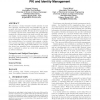759 search results - page 137 / 152 » On formal models for social verification |
ARGMAS
2009
Springer
14 years 3 months ago
2009
Springer
Emotions play an important role in human decision making. This often has a beneficial effect, and so it is desirable to explore whether emotions can also play a role in agent dec...
IDTRUST
2009
ACM
14 years 6 months ago
2009
ACM
We introduce a formal semantics based calculus of trust that explicitly represents trust and quantifies the risk associated with trust in public key infrastructure (PKI) and iden...
ATAL
2009
Springer
14 years 5 months ago
2009
Springer
In hedonic games, players have the opportunity to form coalitions, and have preferences over the coalitions they might join. Such games can be used to model a variety of settings ...
PODS
2008
ACM
14 years 11 months ago
2008
ACM
The W3C Document Object Model (DOM) specifies an XML update library. DOM is written in English, and is therefore not compositional and not complete. We provide a first step toward...
SP
1998
IEEE
14 years 3 months ago
1998
IEEE
A strand is a sequence of events; it represents either the execution of legitimate party in a security protocol or else a sequence of actions by a penetrator. A strand space is a ...

